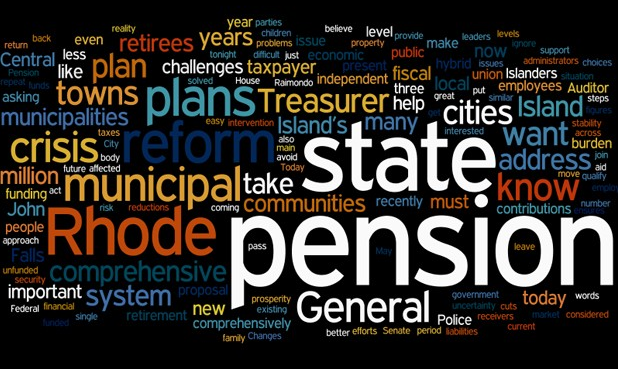Respect and Cooperation with Trump Key to California’s Many Interests
Donald Trump was elected president in part because of the public’s distain for politicians who focus on personal, partisan conflict instead of pragmatic problem solving. The hostile, vehement opposition to President Trump displayed by California Democratic leaders since Election Day confirms that confrontational attitude flourishes in our deep blue state. But why do they keep […]
Politicians Fail on Pensions, Voters Must Step Up Again
Although Governor Brown’s last minute announcement of a pension deal with the legislature left little time for review, analysis and comment on its complex provisions, experts have developed some rough numbers which show just how far short the plan falls of solving California’s pension crisis. A team of independent actuaries looked at the proposed legislation […]
Don’t Be Fooled by Meager Pension Reform

Yesterday, the non-partisan group State Budget Solutions released a report showing that California state government is $617 billion in debt, much of it due to unfunded pension and retiree health benefits. Clearly, California needs strong pension reform measures to solve the math problems that will plague budgets for decades to come. Yet voters should not […]
Voters Need to Fix California’s Government Pension Mess

It’s great to finally see the pension reform debate on the front page. Last week Governor Jerry Brown unveiled a pretty good proposal. It didn’t go nearly far enough to solve the problem, but he certainly went further than most people expected. Also last week, the Legislature held its first hearing on the issue. No […]
CalPERS’ Sophomoric Economic Study Can’t Hide Debts, Losses and Costs
Seeking
to divert attention from its billion dollar losses and huge unfunded
liabilities, this week CalPERS released its own study of the fund’s economic
impact seeking credit for the $26 billion in economic activity generated by its
expensive and generous retirement benefits.
Of course the economic impact
would be exactly the same if General Motors, Boeing or IBM sent the same $12
billion in payments out of a $230 billion pension fund, so there is no credit
to be earned for merely sending out government checks.
Indeed, the
downstream recipients do not care if the money their customers use came from a
public pension fund, a child’s lemonade stand or a jar buried in the back yard. Not surprisingly, the CalPERS sponsored study
glosses over the fact that most of the money they distribute actually comes
from taxpayers, either as employer contributions to the program or as
additional payments imposed to cover staggering pension debts.
These
days across California, employee contributions to public pension costs range
from commonly nothing, up to occasionally 35%, making most of the money in the state
and local government funds the returns on taxpayer contributions. In addition, CalPERS imposes a surcharge on
government agencies to pay for its stock market losses, spectacularly failed
real estate investments and reports on its corrupt former board members and
executives. Taxpayers will be paying
these surcharges for more than 30 years, spreading those costs and huge losses
over two generations of taxpayers.
A Small Handfull of Pension Reform
Yesterday Governor Brown released a list of flagrant pension system abuses he proposes to fix as part of a pension reform package. This handful of first step reforms is great as far as it goes, but voters must not be fooled into believing that these baby steps will solve the pension crisis the Little Hoover Commission recently summarized as "Pension costs will crush government."
Much like the Governor’s thrifty plan to eliminate 50,000 state cell phones to help solve a $26 billion budget deficit, these token reforms are more symbolic gestures than substantive solutions to more than $200 billion in pension debts. Painless antibiotics will not cure cancer; you need radiation and chemotherapy.
Who is in Charge of All That Money?
With more than $230 billion in assets to manage and the responsibility to buy health care benefits for 1.3 million people, the taxpayers of California have a tremendous amount of money riding on the people who govern and operate the California Public Employee Retirement System (CalPERS). This week, two events at CalPERS provide taxpayers good reasons to secure their wallets and demand change.
First, the CalPERS board received an investigative report detailing the shameful, corrupt conduct of its former CEO, board members and senior staff. In concert with outside investors and middlemen, these CalPERS insiders rigged investment decisions to benefit friends, paid generous management fees to favored firms and tried to buy political support with pension fund money. Their fates will ultimately be decided in the courts, but voters will need to change the governance of all pension boards to protect themselves.
The report reveals that these public employees were playing in a Wall Street fast lane where $4 million is a small finder’s fee, $5 million is a gambling debt and private jets are used to close billion dollar deals. These unconscionable abuses were perpetrated by the board members, in direct conflict with their fiduciary duty under the state constitution to put the system’s beneficiaries’ and participants’ interests above their own. These were not rogue employees, these were unaccountable CalPERS leaders enriching themselves at the public expense.
State must protect itself by reforming public pensions
During his inaugural address, Gov.
Jerry Brown urged legislators to leave their political comfort zones, unite as
Californians, honestly assess our budget deficits and make the tough decisions
required for the long-term good of California.
There is no better issue to
demonstrate a welcome bipartisan resolve than reforming California’s state and
local public employee pension systems.
With projected state and local
unfunded retirement benefit liabilities as much as $700 billion, state leaders
cannot make a serious impact on our fiscal health without substantial,
fundamental change in these far too generous benefits.

